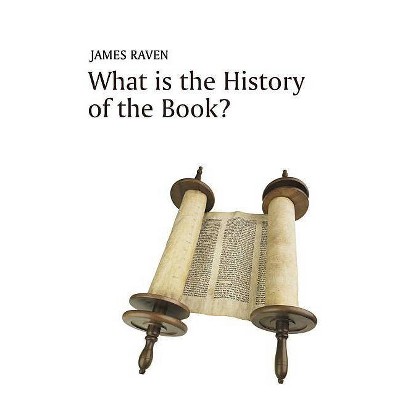The Annotated Pickett's History of Alabama - by James Albert Pickett (Hardcover)

Similar Products
Products of same category from the store
AllProduct info
<p/><br></br><p><b> About the Book </b></p></br></br><em>The Annotated Pickett's History of Alabama, And Incidentally of Georgia and Mississippi, from the Earliest Period</em> is a one-of-a-kind publication. It represents a major addition to the literature on the early settlement of Alabama and the Deep South. The NewSouth Books edition of the work is fully illustrated, and has been updated for contemporary readers and annotated for the first time. Significantly, the work is comprehensively indexed and carries an introduction by James P. Pate, a scholar in the field. Volumes I and II of the original work are combined in this book. Facsimile editions of Pickett's history exist, but there have been no other hardcover editions of the book in over a century. Certainly, no edition makes Pickett's masterpiece so accessible to general readers and scholars alike. The release of the NewSouth Books edition of Pickett's history is timed to coincide with the 200th anniversary in 2019 of Alabama statehood, and is likely to be the definitive edition of the History for the next 200 years.<p/><br></br><p><b> Book Synopsis </b></p></br></br>Albert James Pickett's <em>History of Alabama, and Incidentally of Georgia and Mississippi, from the Earliest Period</em> first appeared in Montgomery bookstores in September 1851. The buyers of his two-volume work paid $3 and the demand caused Charleston publisher Walker and James to issue a second and third edition before year's end. William Gilmore Simms, the South's most prolific writer, referred to the publication as "one of the prettiest specimens of book making ever done in America." Newspapers in Alabama and literary journals in New York, Charleston, and New Orleans commended Pickett for his "absolutely enchanting" fresh writing style, for using "great care" throughout his book, and for "his important service to his state." While some reviews questioned his narrative style, his sources, or his focus on facts, others credited Pickett for producing "a very valuable" chronicle for the people of Alabama and urged him to produce a third volume for "rising generations." Pickett opens volume one with Hernando de Soto's explorations from Florida to Arkansas, encounters with native people, and discovery of the Mississippi River. He shifts from the early chiefdoms of the protohistoric period to the Natchez and smaller tribes in the coastal plain and then to the major Indian nations of the interior into the late eighteenth century. While the struggles of French Louisiana with the Natchez dominate the first volume, Pickett establishes the English presence with the founding of Oglethorpe's Georgia colony and ends with the surrender of the French forts Tombecbé and Toulouse to the British. In volume two, Pickett traces the English push into present-day Alabama and Mississippi and the Revolutionary War era, the Spanish occupation of East and West Florida, the intrigues of Alexander McGillivray and William Bowles, and Georgia's Yazoo land sales. He devotes several chapters to the Mississippi Territory, Aaron Burr, and the Indian unrest that led to the massacre at Fort Mims, the Creek War of 1813-14, and Andrew Jackson's campaigns to destroy the Red Sticks and defeat the British in the Gulf South. Pickett concentrates his final chapters on the emergence of Alabama as a territory and state, including biographical sketches of early state leaders, the state constitutional convention, and Alabama's first governor, William Wyatt Bibb, who died in 1820. Despite Pickett's failure use his firsthand knowledge to bring his <em>History</em> chronologically beyond 1820, his work continues to be a relevant study of the state's protohistory, colonial, territorial and early foundations. His work and his papers in the state archives are cited by all serious scholars who study Alabama's colonial and territorial eras. While he sought all the available printed primary sources and manuscripts for volume one, his second volume was principally informed by the memoirs, reminiscences, letters, and oral interviews of the participants in the events that shaped the development of Alabama from the pre-Revolutionary era through the 1840s. Although recent literary deconstruction of Pickett and his <em>History</em> has been critical of his motivation and writing, Harper Lee, Alabama's most consequential writer in the twentieth century, asserted in 1983 that he "deserves a place in American literature" and assessed his History as a "unique treasure" that "should be in every high school library" in Alabama. More recently, historian Leah Rawls Atkins declared Pickett to be the writer made the "most historical contribution to Alabama" in the antebellum period. This new edition is the first to provide general readers and scholars with a readily available hardbound, fully indexed, and annotated version of Pickett's <em>History</em>.<p/><br></br><p><b> Review Quotes </b></p></br></br><br>It's been 167 years since Alabama's first historian released his findings related to the state's start. Now, another historian has taken that first even further. <em>The Annotated Pickett's History of Alabama</em> is the only annotation of Albert James Pickett's famous book, and the first version to come with a full index or edit. Dr. James Pate, in turn, has taken care to verify sources and elaborate on the persons and events featured in Pickett's work. -- <b><em>Athens News Courier</em></b><br><br><em>The Annotated Pickett's History of Alabama, and Incidentally of Georgia and Mississippi, from the Earliest Period</em>, is a history lover's dream. What makes this new edition so valuable is that the editor, James Pate, pulled together other historical records and interviews in the annotated version of the book to dispute or explain portions of the history. The book's nearly 700 pages are jammed with historical references and footnotes in addition to the written history of stories and record. -- <b><em>Opelika-Auburn News</em></b><br><br>Already a grand tour of Alabama history, Pickett's <em>History of Alabama</em> is now a more accurate one and an impressive accounting of some of the best scholarship on the state's colonial, territorial, and early statehood years currently available. -- <b>Mike Bunn</b>, Alabama historian and co-editor of <em>The Historian's Manifesto</em><br><br>In his <em>History of Alabama</em>, Albert James Pickett showed an unusual interest, for his time, in the intersections between colonists and the American Indians who inhabited what would become the state of Alabama. Pickett's narrative is a crucial source for nineteenth-century interpretations and understandings of those relations, not only for Alabama, but for the South at large. Additionally, Pickett's <em>History</em> includes some rare primary source material on Alabama's native people. We now, for the first time, have an annotated version of Pickett's <em>History</em>. Historian James P. Pate offers not only a detailed introduction to the volume, but careful and much-needed annotations that clarify, correct, contextualize, and amplify Pickett's text. This version will supplant all others. -- <b>Robbie Ethridge</b>, professor of anthropology, University of Mississippi, author of <em>Creek Country: The Creek Indians and Their World</em><br><br>James P. Pate has edited and annotated an important new edition of Albert James Pickett's <em>History of Alabama</em>. This classic, nineteenth-century text receives thoughtful comments and annotations in his careful hands. Pate clearly introduces and contextualizes Pickett's decades-long labor of love. Pickett used Spanish, French, and native sources to tell the multilingual, diverse, and contested histories of the region. This new edition reminds readers of the long, deep, and fascinating history of the American South. -- <b>Alejandra Dubcovsky</b>, author of <em>Informed Power: Communication in the Early American South</em><br><br>James Pate has produced an extremely useful modern edition of Pickett's <em>History of Alabama</em>, ensuring that the work will continue to shape knowledge of the state and the antebellum context in which Pickett wrote. Pate employs annotations--a most impressive and helpful feature of the volume--to discuss Pickett's judgments and uses of source material as well as to identify modern scholarship on the Old Southwest that validates or challenges Pickett's claims. Pate's knowledge of both the primary and secondary source literature is extensive. He has made Pickett's grand narrative accessible to modern readers and useful for scholars of Alabama history and the history of the Old Southwest. -- <b><em>Journal of Southern History</em></b><br><br>Pickett's <em>History of Alabama</em>, first published in 1851, has remained a primary source for understanding about the early history of Alabama. For decades, libraries shelved their copies in their rare books collections, behind locked doors. With its republication by NewSouth Books -- in a handsome fully annotated, indexed, and illustrated edition made possible by Dr. James Pate -- the book is given magnificent second life. Everyone should have a copy of this important work, and now can. -- <b>Leah Rawls Atkins</b>, historian, co-author of <em>Alabama: The History of a Deep South State</em><br><br>The first history of the state has been out of print more than a century -- and is still worth reading, especially with the annotations James Pate gives us in the margins of Pickett's original text. Pickett's history is rich and exciting, if a bit romantic for modern tastes, but with Professor Pate's annotations and a complete index it certainly rewards the 21st-century reader handsomely. Added to which, this book is physically beautiful in its design and layout. -- <b><em>Lagniappe</em></b><br><br>The republication of Pickett's <em>History</em> in a new edition that is updated, annotated, and indexed for the first time is significant and will be a welcome addition to many bookshelves. Thanks to James Pate for reintroducing us to Pickett's sturdy narrative of all that transpired in the centuries before Alabama became a state. -- <b>Peter H. Wood</b>, professor of history, Duke University, co-editor of <em>Powhatan's Mantle: Indians in the Colonial Southeast</em><br><br>This new edition of Albert Pickett's <em>History of Alabama</em> is itself a historic event. Pickett's stories -- many based on personal interviews -- are now classic. They convey a sense of Alabama life before statehood no other book can match, rich with details. And Jim Pate's excellent annotations help modern readers follow the narrative more easily. In nicely designed side notes, he identifies people and places that may no longer be familiar and also updates us on insights of historians today. We have needed an annotated <em>History</em> for a long time. This new edition fills that need beautifully. -- <b>Edwin Bridges</b>, former director of the Alabama Department of Archives and History, author of <em>Alabama: The Making of An American State</em><br><br>With <em>The Annotated Pickett's History of Alabama</em>, Jim Pate invites modern readers to take a fresh look at a classic by Alabama's first historian, now illuminated by more than a century and a half of scholarship accomplished in Pickett's wake. -- <b>Gregory A. Waselkov</b>, emeritus professor of anthropology at the University of South Alabama, author of <em>A Conquering Spirit: Fort Mims and the Redstick War of 1813-1814</em><br>
Price History
Cheapest price in the interval: 36.99 on November 8, 2021
Most expensive price in the interval: 36.99 on December 20, 2021
Price Archive shows prices from various stores, lets you see history and find the cheapest. There is no actual sale on the website. For all support, inquiry and suggestion messagescommunication@pricearchive.us




















